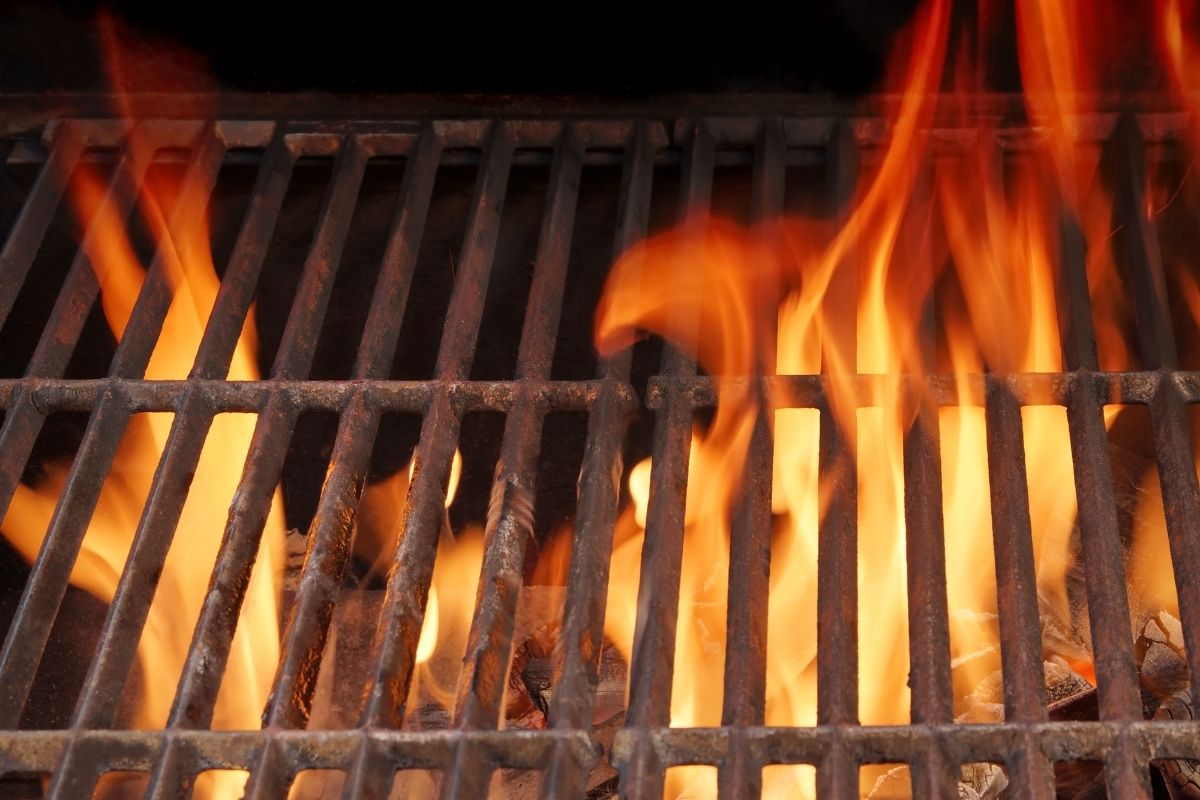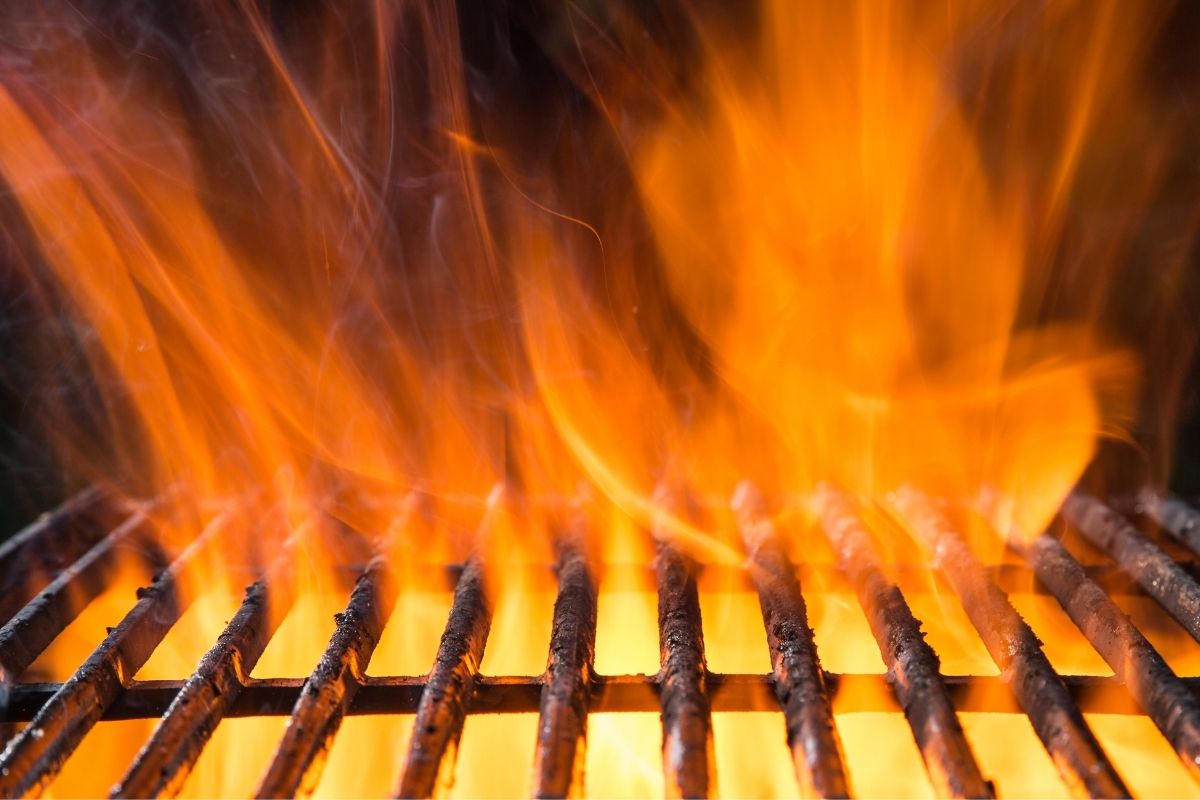So many people have been turning to barbecues and grills when looking for their next good meal, however, it’s a lot easier said than done because of how much upkeep the appliances require.
Barbecues, grills, and smokers can get lots of greases and food residue stuck to the grates and will require cleaning to make sure that your cooking equipment is good enough to use.

There’s nothing worse than not knowing where to start and how to go about cleaning your cast iron grates, but there’s no need to stress.
We’ve made a guide to help your task become a lot easier. With a five-step guide, you’ll be able to clean your grates and start cooking again as quickly as possible.
At the end of the day, the cleaning will allow you to enjoy your food as much as you can.
What Are Cast Iron Grates?
Cast iron grates are an essential piece of equipment in every kitchen or outside grill. They’re used by everyone, from chefs to home cooks who want to cook on the grill or stovetop.
The beauty of cast iron grates is that they don’t rust as easily as other metals, so they won’t get damaged over time like other types of cookware.
This means that if you take care of them, they’ll last for years. But you need to clean them frequently.
If you love using your cast iron grates at home, then you know just how important the maintenance is.
If you haven’t cleaned your grates in a while, then you might find yourself with some rusty parts and excess dirt that will need removing.
How Do Iron Grates Get Dirty?
The truth is, most of us don’t realize that our cast iron grates are going to get dirty. It seems that we think that these pieces of cookware should always look shiny and new, but this isn’t true.
When your grates are left unattended, they’re going to pick up all sorts of food debris and grease.
Over time, this will lead to food particles being deposited onto the surface of the grate.
This makes it difficult for the heat to penetrate the material below. As a result, your food may begin to burn before it has cooked through.
What Foods Are Bad For Grease?
You probably already knew that certain foods were bad for sticking to the bottom of pans, but did you know that the same applies to cast iron grates?
If you leave your cast iron grates exposed to any sort of grease, they’re going to quickly develop dark spots.
These dark spots aren’t black – instead, they’re more of a reddish-brown color. While you might think that this doesn’t matter, it does affect the way that the grate heats up.
Steak
Steak and other forms of beef have been known to stick to grates and will often leave behind a lot of their juices and fats.
Because of this, it’s always best to clean your grates after cooking steak, no matter what cut of steak it might be.
Pork And Ham
While pork chops and ham steaks are the perfect meats for grilling, both of these cuts are also known to stick to the grates.
Pork chops tend to do this more often than ham steaks, which could be because pork chops are usually bigger than ham steaks.
Regardless, it’s still best to clean your grills after cooking either cut of meat.
Chicken
Since chicken tends to be one of the most popular meals when it comes to eating out, many people are surprised to learn that the skin of chickens is very sticky.
Not only does this make it harder to remove the bird once it has been cooked, but it also makes it difficult to keep the chicken warm until ready to serve.
The easiest solution to this problem is to use a baking sheet to catch the drippings and place the whole thing inside the oven.
You can even flip the chicken halfway through cooking to ensure that it gets evenly browned and cooked through.
Cleaning Supplies You’ll Need
The first place to start, before even attempting to clean your cooking equipment, is to know what tools you’ll need to get the job done.
You don’t need the highest quality available, just enough to get the job done. As long as you’ve got hard work and perseverance, that’s the main part of the job. The things you’ll need include:
- Vinegar
- Baking soda
- Soapy water
- Steel brush/scraper
- Oven cleaner
Cleaning Your Iron Grates
Step One – Remove The Grates
The best way to clean your grates is to remove them from your cooking appliance so that you don’t end up getting cleaning fluids inside of your cooker.
Step Two – Soapy Water
Wash the grates with warm soapy water and make sure that all of the grates are covered to ensure no grime or grease is missed.
Soap and water will help to break down the grease molecules on the grates.
Step Three – Soak The Grates
Use your vinegar and baking soda to create a solution and place the grates in the mixture.
Make sure that the grates get soaked and ensure that all of the grates get enough attention to avoid missing any areas.
Step Four – Apply Oven Cleaner
Using an oven cleaner is a great way to ensure that you don’t miss any more areas.
Because of how hard grime and grease can be to remove from iron grates, you might need a bit of oven cleaner to give yourself a helping hand.
Step Five – Place Grates Back To Dry
If you’ve taken your grates from your oven then it’s best to place them back and turn the oven fans on at a lower heat.
This will ensure the grates get dried fully and will get rid of all of the moisture. Then, repeat this process whenever you see fit – the more frequently you do this, the better!
How Often Should I Clean My Iron Grates?

It depends on how dirty your grill is. If you have a lot of food stuck to the grates, then you should probably wash them every time you cook.
However, if there isn’t much debris on the grates, then they may not need washing as often.
It’s always best to clean frequently because this prevents the build-up of rust and forms of grease in the future.
The longer you wait, the more chance there is that these elements will build.
Different Cooking Appliances That Use Iron Grates
Cooking appliances like stoves and fryers have different types of grates. Some have removable grates while others have fixed grates.
Regardless of which type your particular unit uses, it’s important to ensure that you clean them regularly. Of course, the easiest form is the grates that can be removed and cleaned thoroughly.
Stove Top Cooktops
Most stovetop cooktops come with a single or double rack. These racks usually sit over a burner and allow you to cook directly on top of the surface.
Usually, these burners are either gas or electric. Gas burners tend to heat faster than electric burners, however, they’re less controllable.
Electric burners require more maintenance and care but offer greater control.
Smokers
Smokers use charcoal or wood for fuel. They’re used to smoke foods, such as meats, fish, poultry, etc. As far as cleaning goes, smokers are typically easy to maintain.
You’ll just need to wipe off the ashtray after each use.
Fryers
Frying pans are used to cook foods using oil or shortening. They’re generally made out of cast iron, stainless steel, ceramic, glass, or enameled steel.
Frying pans are designed to hold small amounts of oil and are perfect for frying vegetables and meats.
Grills
Grills are used to cook food using fire. They generally consist of two parts: the cooking grate and the lid.
There are various styles of grills available including the kettle style, hibachi style, offset barbecue, rotisserie, etc.
Many of these grills also include accessories like side tables, baskets, hooks, shelves, etc.
Ovens
Many people think that ovens only work when they bake. In reality, many ovens can be used for other purposes.
For example, some ovens can be used to roast, broil, steam, slow-cook, and even make pizza.
Conclusion
The key to preventing rust from building up in your kitchen appliances is keeping them clean. The easiest way to do this is by wiping down the surfaces with a soft cloth.
Make sure that you keep your appliances dry by placing them on an absorbent mat or towel. Also, don’t forget about those under-the-counter areas. Keep them clean too!
However, because grills are the most integral part of any sort of cooking appliance, it makes sense to focus on these before moving on to other areas of the equipment.
By using vinegar and baking soda, you’re breaking down the rust and grease molecules that may have formed whilst cooking your meals.
At the end of the day, nobody wants to spend more time cleaning than cooking, so get this task out of the way and you can start thinking about your next meal!
- The 9 Best BBQ Grills for Smoking Brisket - December 29, 2022
- 6 Mouth Watering Grilled Shrimp Recipes - September 16, 2022
- 6 Delicious Grilled Desserts - September 16, 2022
